 Passover’s Message of Hope in the Aftermath of Oct. 7
Passover’s Message of Hope in the Aftermath of Oct. 7
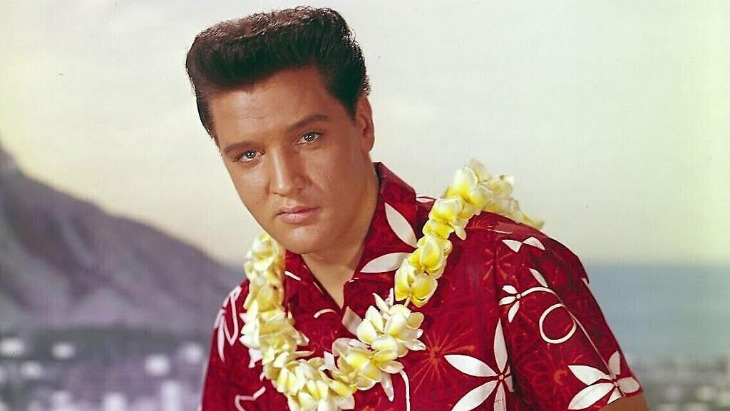

6 min read
The Lansky Bros. are responsible for Elvis’s fashion sense. But don’t blame them for the jumpsuits.
I’m a new Elvis fan, thanks to the pilgrimage I made to Graceland during Elvis Week last August, marking the anniversary of The King’s passing. The place was deserted due to Covid.
But this year, with Baz Lurhmann’s new biopic “Elvis” and the 45th anniversary of Elvis’ death on Aug. 16, the place will be all shook up with fans flocking in for nine days of concerts, conversations and candlelight vigils.
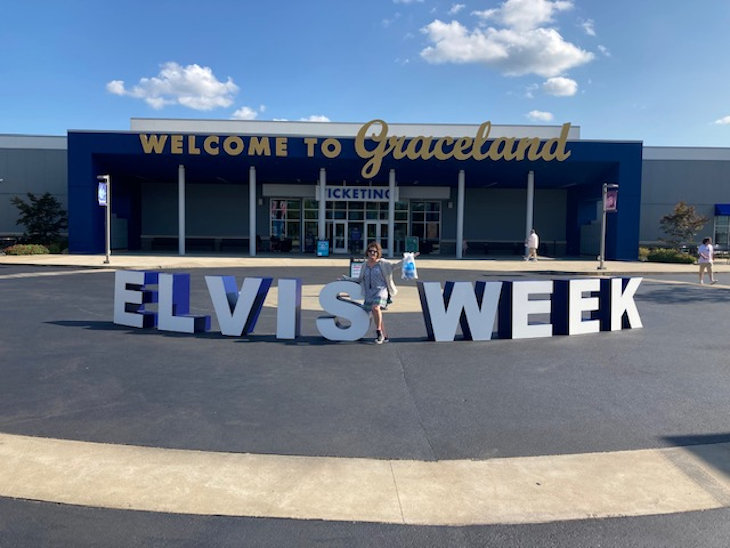 My visit to Graceland
My visit to Graceland
Here are 7 Jewish connections Elvis had:
“Elvis could not go out publicly during the daytime to bowl, practice karate, see movies or anything else,” retired attorney and former JCC President Ron Harkavy explains. So Elvis and his entourage would come late at night to play. He also made annual donations to the JCC. “My wife says Elvis was particularly kind to the kids—just a really sweet guy,” reports Ron.
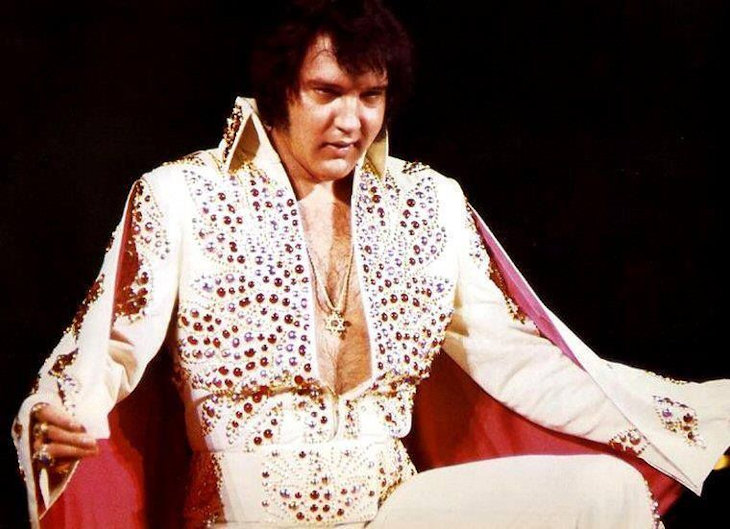
“I just don’t want to miss getting through the gates of Heaven on a technicality,” Elvis would quip.
In the early 1950s, Rabbi Alfred Fruchter’s family shared a Memphis duplex with Elvis’ family at 462 Alabama Ave. The Presleys rented the small apartment downstairs and the rabbi’s family lived upstairs.
“The Presleys were even poorer than my family,” Judy Fruchter Minkove wrote in the Baltimore Sun in 2004. “My father was the Orthodox rabbi for a small congregation and later founded and became principal of the Memphis Hebrew Academy. During the day, my mother would share coffee with Gladys Presley. In our house, Elvis was known as the ‘Shabbos goy,’ the gentile who would turn on lights for us Friday nights or Saturdays, when Orthodox Jews are forbidden to light a fire, which in time evolved into not turning on lights.”
Elvis refused to take any money for his help. On Sundays he accompanied his own family to church, dressed in his finest clothes.
The media called the group of Elvis friends, associates and employees who protected and served Elvis from the beginning of his career in 1954 until his death in 1977 the “Memphis Mafia.” Included were George Klein, Marty Lacker and Alan Fortas.
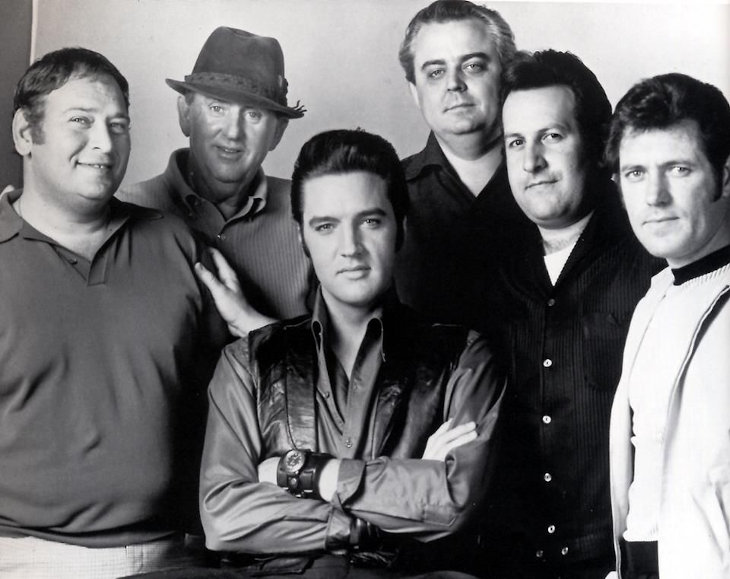 Elvis and the Memphis Mafia. Alan Fortas is on the far left.
Elvis and the Memphis Mafia. Alan Fortas is on the far left.
Klein, a radio deejay and TV host, was Elvis’ right-hand man. The King’s death in 1977 deeply affected Klein. “I had never been a particularly Orthodox Jew, but after Elvis died, I followed the Jewish tradition of yahrzeit – a year of mourning marked with daily morning and evening prayers,” he recounted to The Jewish Chronicle. Nearly a decade later, Priscilla and Lisa Marie Presley asked Klein to accept Elvis’ award for induction into the Rock and Roll Hall of Fame.
Marty Lacker, who knew Elvis in junior high school, was one of his most trusted friends. He served as bookkeeper, secretary and sounding board, and was honored to be one of Elvis’ two best men at the wedding to Priscilla in 1967.
Alan Fortas acted as a bodyguard and general assistant to Elvis. He was the nephew of former Supreme Court Justice Abe Fortas.
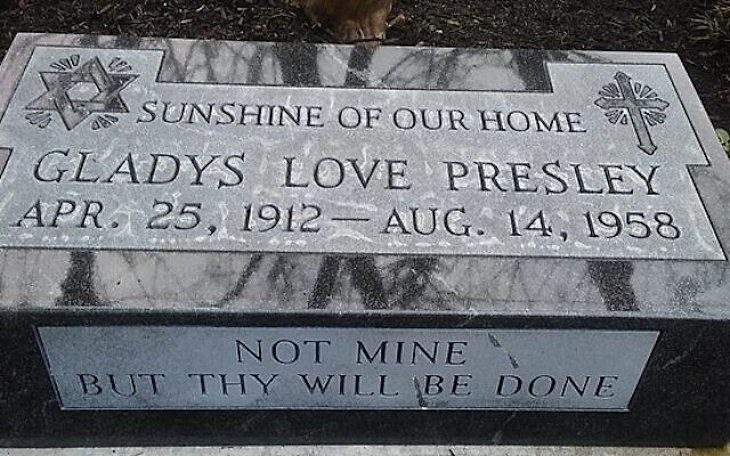
According to the Aug. 15, 2018, issue of the Memphis Commercial Appeal, “In recognition of the 60th anniversary of Gladys Presley's death, the tombstone Elvis designed for his beloved mother — complete with a Star of David, to acknowledge her Jewish heritage — has been exhumed from storage and placed permanently at the Graceland Meditation Garden, near the grave of Gladys' world-famous son." (Related article: Was Elvis Presley Jewish?)
In addition to the Memphis Jewish Community Center, he supported the Memphis Hebrew Academy (now the Margolin Hebrew Academy). Larry Moss, a Jewish diehard fan, says Elvis also paid for a senior lounge at Baron Hirsch Synagogue, in memory of the mother of one of his Jewish friends.
With a $125 loan from their Polish-born father, brothers Bernard and Guy Lansky started a retail business in 1946 selling Army fatigues and surplus. By the early 1950s, Lansky Bros. turned the focus of its Beale Street store to high-fashion men’s clothing.
“Elvis started coming to the store in 1952,” Hal Lansky told Aish.com. “He loved the music on Beale Street. He loved the African American lifestyle.”
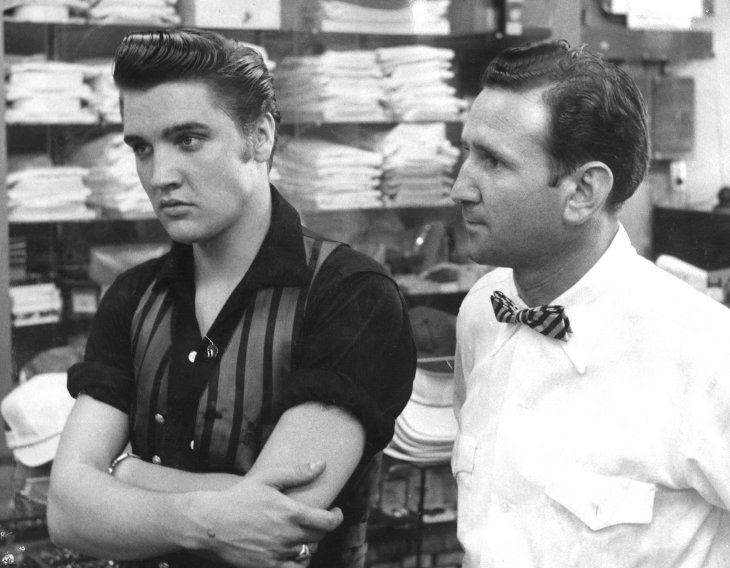 Elvis with Bernard Lansky, 1956
Elvis with Bernard Lansky, 1956
Although Beale Street primarily moved to an African American beat, many of the merchants were Jewish. They owned pawnshops, beauty supplies, cafes, jewelers and shoe stores.
“My dad knew this young man with a black ducktail who was staring in the window was out of place. He said, ‘Come on in young man.’” Lansky showed the teenager around, but Elvis could only afford a $3 shirt.
Elvis worked around the corner as an usher at the movie theater. He said, “Mr. Lansky, I don’t have any money but one of these days when I get rich I’m going to buy you out.”
“Don’t buy me out,” Bernard Lansky replied, “just buy from me.”
We don’t like to take credit for the jumpsuits. We like to take credit for young Elvis.
Lansky Bros. took care of Elvis for three decades. “We like to take credit for the black and pink color combo of the ‘50s; they featured that in the movie,” says Hal Lansky. “In the ‘60s, Elvis had the continental look, the skinny suits, the narrow lapels, tight-fitting pants. Mid-60s styles changed to the mod look from London—bellbottoms, paisleys. Elvis loved that stuff. He loved to wear stripes with plaids. Anything you put on Elvis looked good. In the 70s, it was the Super Fly look, with wide-brim hats, long leather coats, platform shoes, mink collars and cuffs on outfits and capes. We don’t like to take credit for the jumpsuits. We like to take credit for young Elvis.”
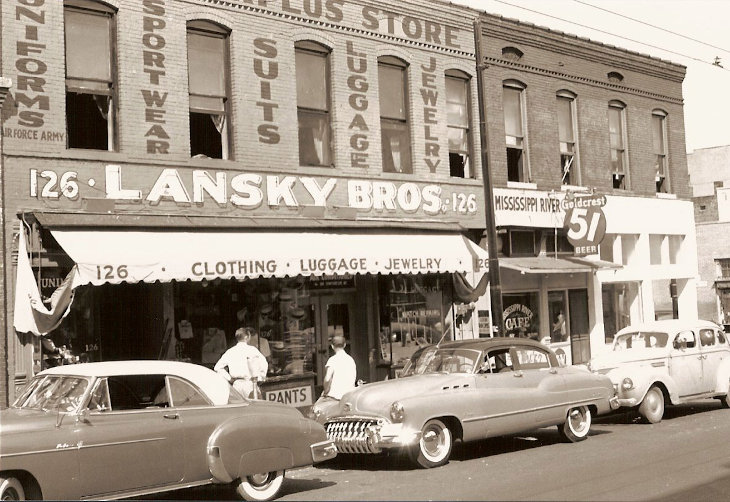
Baz Luhrman and actor Austin Butler, who played Elvis, visited the store in 2019 in preparation for the biopic. Hal says they are happy to be included in the movie. “Lansky’s is an integral part of Elvis’ style. My dad helped him and put the clothes on him that made the complete package.”
And Hal and his daughter Julie are delighted with the increase in traffic to the store since the movie came out.

You mention his mother's "Jewish heritage" but not the fact that having a Jewish mother makes Elvis... Jewish! Shouldn't that fact be the #1 Jewish Thing that you didn't know about Elvis? (Reference: see the book Schmelvis.)
I read the article with a feeling that Rivka Ronda Robinson had read my book, “The Jewish World of Elvis Presley,” (2020), in because I discuss all of those seven things about the Jewish Elvis that she included in her article and much more.
There were actually five Jewish members of Elvis’ inner circle. It was Larry Geller who was Elvis’ spiritual guru. He shared with Elvis the Kabala and aspects of Jewish mysticism; and Elvis was particularly fascinated by the Gematria, the meaning of certain numbers and Hebrew letters.
I would encourage anyone interested in Elvis’ own Jewish roots and his relationship with many, many others (Jewish songwriters, directors, etc.) to read “The Jewish World of Elvis Presley.”